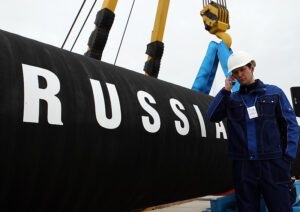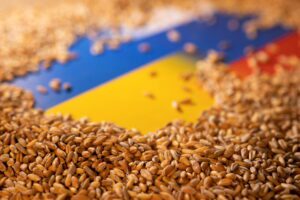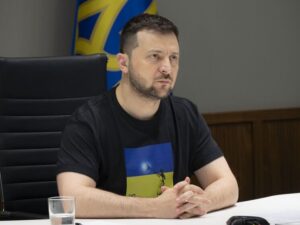
The volume of gas supplies from Russia to Europe has now halved compared to last summer, and their further decline is not ruled out, European Commission energy member Kadri Simson said on Monday.
“Gas deliveries from Russia now make up half of the volumes that we received at the same time last year. They may continue to decline,” Simson said before the EU meeting at the level of ministers of energy, transport and telecommunications.
With regard to gas supplies, the EU is ready for any developments, she stressed.
Simson added that at the meeting on Monday, she will present to the ministers concrete steps that, in her opinion, would help the countries of the union to be better prepared for the reduction in gas supplies. One such step is coordinating a reduction in demand for gas.
On Saturday, Simson said that 12 EU states were completely or partially left without gas from Russia. She added that last week the EU reached an agreement to increase gas supplies with Israel and Egypt, deepened cooperation with Norway, and final direct negotiations with Azerbaijan.
Simson stressed, BNS reports, that joint gas purchases require unanimity and coordination between member states, and that the work of the European Commission creates the necessary conditions for this.
“The good news is that in May, a record was once again set for the flow of LNG to Europe – 12.8 billion cubic meters – this is the largest monthly volume in history,” she said.
At the end of May, it was reported that Poland, Bulgaria, Finland and the Netherlands, due to their refusal to accept the new settlement system, had lost the opportunity to receive Russian gas.

The number of refugees from Ukraine registered for temporary protection or similar national protection schemes in Europe stood at 3.207 million as of June 16, 2022, the Office of the United Nations High Commissioner for Refugees (UNHCR) reported on its website.
Compared to the June 1 data, the increase was almost 0.5 million, including 0.2 million in the last week, significantly contributed by data updates in Germany, France and the UK.
According to UNHCR data collected from national governments, the largest number of refugees with temporary protection status in Poland is 1 million 169.5 thousand, while 4,166 arrived in the country from Ukraine, according to the Polish border service, from the beginning of the war to June 18 million people, and 2.195 million went to Ukraine in the opposite direction.
Following are Germany and the Czech Republic, where the number of refugees registered for temporary protection from Ukraine amounted to 641.39 thousand and 373.82 thousand, respectively.
The UN, referring to government data, indicates that in total in Germany, where Ukrainians are allowed to stay without registration until the end of August, 780,000 refugees from Ukraine were recorded. Based on the data presented, a significant proportion of them have not yet applied for temporary protection status in that country.
In the Czech Republic, the situation, according to UN information, is different: almost all arrivals applied for protection status – 373.82 thousand out of 373.97 thousand.
In the vast majority of other countries, the picture is similar to the Czech Republic: the statistics of registered refugees is completely or almost equal to the statistics of those who applied for protection status, which is probably due to the peculiarity of their registration. An exception, similar to Germany, is only Romania – 37.83 thousand with the status of 90.3 thousand refugees registered in the country, Estonia – 27.49 thousand out of 42.26 thousand and Italy – 97.31 thousand out of 129 .62 thousand
In addition to Poland, the Czech Republic, Germany and Italy, more than 50 thousand refugees from Ukraine have also registered for the status of temporary protection in Spain – 119.74 thousand, France – 87.97 thousand, Slovakia – 78.11 thousand (out of 270 thousand). net inflow across the border since the beginning of the war), Austria – 71.83 thousand, Great Britain – 70.5 thousand, the Netherlands – 64.48 thousand and Switzerland – 55.92 thousand.
At the same time, in Lithuania, the number of refugees with temporary protection status decreased from 53.89 thousand to 46.55 thousand over the week.
Next come Belgium – 46.85 thousand, Portugal – 42.15 thousand, Sweden – 38.05 thousand, Ireland – 36.91, Denmark – 28.29 thousand, Latvia – 26.8 thousand and Finland – 26.75 thousand, as well as the above-mentioned Romania and Estonia.
From 10 to 25 thousand refugees from Ukraine with the status of temporary protection in Hungary – 24.45 thousand, Norway – 18.51 thousand, Greece – 14.89 thousand, Croatia – 14.26 thousand and Cyprus – 13 .05 thousand
In addition, the UN statistics on those who received the status of temporary protection include Ukrainian refugees in Slovenia – 7.1 thousand, Luxembourg – 5.25 thousand, Montenegro – 3.98 thousand, Iceland – 0.9 thousand, Malta – 0 .92 thousand, in Serbia and Kosovo – 0.75 thousand and Liechtenstein – 0.22 thousand.
In addition, the table contains data from Bulgaria, possibly entered with an error: according to them, 79.2 thousand refugees from Ukraine were recorded there, but 114.88 thousand received protection status.
The UN also indicated the countries in which refugees from Ukraine were recorded, but there is no data on their obtaining status: Moldova – 85.5 thousand, Georgia – 20.39 thousand, Azerbaijan – 4.84 thousand, Albania – 1.53 thousand, North Macedonia – 1.21 thousand, Armenia – 0.49 thousand and Bosnia and Herzegovina – 0.33 thousand.
Turkey, where 145,000 refugees from Ukraine were listed a week ago, is now excluded from the data.
Separately, it is worth mentioning Russia and Belarus, the Ukrainian border with which, respectively, 1 million 230.8 thousand and 16.66 thousand people crossed. The UN information indicates that in the Russian Federation all those who crossed the border were recorded, while in Belarus – 9.01 thousand. There is no data on any status of these people, as well as data on crossing the border of Ukraine in the opposite direction.

Whole Europe must unite its efforts and act boldly in order to solve the problem of safe transportation and shipment or Ukrainian grain, Prime Minister of Italy Mario Draghi has said.
“We must do everything possible to not let the situation become dramatic… To avoid… a serious crisis, we must ensure safe transportation of grain. This must not cause a global disaster. For this we must focus on how to organize grain transportation through the Black Sea. Russia, unfortunately, does not make advances. We must fight against this problem bravely and boldly, just like President Zelensky. And we, the Europeans, must act together,” Draghi said during a press conference following a meeting of the leaders of Ukraine, France, Germany, Italy, and Romania in Kyiv on Thursday.
He added that there is some time to solve this problem as “the harvest will be ready mainly in September.”

Verkhovna Rada Chairman Ruslan Stefanchuk said he hoped Austria would realize the strategic role of Ukraine as a guarantor of security for Europe.
“I hope Austria will realize the strategic role of Ukraine as a guarantor of security for Europe as well as economic potential of our country and support Ukraine’s EU aspirations,” he said during a meeting with President of the National Council of Austria Wolfgang Sobotka in Vienna on Tuesday.
According to a statement posted on the website of the Ukrainian parliament, the officials discussed support for Ukraine on its way towards obtaining the status of EU candidate, Austria’s participation in the revival of Ukraine, and punishment for the aggressor country Russia for waging the war against Ukraine.
Stefanchuk stressed the importance of a regular inter-parliamentary dialogue and the recognition by the Austrian parliament of the 1932-1933 Holodomor famine in Ukraine genocide against the Ukrainian people.
He also invited his Austrian counterpart to visit Ukraine.

President of Ukraine Volodymyr Zelensky believes that keeping Ukraine outside the EU, European unification works against Europe.
“The final stage of a large diplomatic marathon has begun, which should end in a week and a half. And we are in this marathon together with the European Union, on the same team,” he said in a traditional video message on Saturday evening.
According to Zelensky, “we will soon receive an answer about the status of a candidate for EU membership.”
“I am convinced that this decision can strengthen not only our state, but the entire European Union. What else needs to happen in Europe to make it clear to skeptics that the very fact of keeping Ukraine outside the EU, European unification works against Europe?” he.
For example, the president noted, “everything is obvious to the Russian occupiers, they say so when they mock our people, this is supposedly because Ukraine went to Europe. Where are the skeptics in Europe then?”

President of Ukraine Volodymyr Zelensky said that the European Union’s response to Ukraine’s application for membership will show whether Europe has a future.
“Now, of course, is a decisive time. Not only for Ukraine, but also for the European Union, for the entire European continent. Now it is being decided what the future of a united Europe will be like and whether it will be at all. Russia wants to destroy European unity, wants to leave Europe split and weak. All of Europe is a target for Russia, and Ukraine is only the first stage in this aggression, in these plans,” Zelensky said at a briefing with European Commission President Ursula von der Leyen in Kyiv on Saturday.
That is why, according to the head of state, “a positive response of the European Union to the Ukrainian application for EU membership can become a positive answer to the question – does the European project have a future at all.”
Zelensky stressed that the people of Ukraine have already made a great contribution to the protection of freedom and values shared with the European Union.
“Thousands of Ukrainian lives were given to live in Ukraine and all of Europe as a person, to live freely. During such a brutal war, Ukrainians made sure that state and public institutions remain stable. Our people are absolutely integrated into the European space,” he said.
He also noted that polls conducted among the European population showed that people support Ukraine in joining the EU.
“And this is fair. And we are really looking forward to the recognition of this reality at the political level on June 23-24, when the historic meeting of the European Council for us should take place. Its logical decision should be to grant Ukraine the status of an EU candidate country. We really believe in this … The Ukrainian people will do everything necessary for the European integration of Ukraine,” Zelensky stressed, adding that “the European project definitely cannot be completed without Ukraine.”
EU, EUROPE, FUTURE, MEMBERSHIP, ZELENSKY